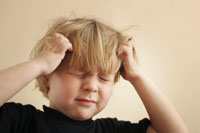Archived Content
The National Institute of Mental Health archives materials that are over 4 years old and no longer being updated. The content on this page is provided for historical reference purposes only and may not reflect current knowledge or information.
Atypical Antipsychotic More Effective than Older Drugs in Treating Childhood Mania, but Side Effects Can Be Serious
• Science Update
The antipsychotic medication risperidone is more effective for initial treatment of mania in children diagnosed with bipolar disorder compared to other mood stabilizing medications, but it carries the potential for serious metabolic side effects, according to an NIMH-funded study published online ahead of print January 2, 2012, in the Archives of General Psychiatry.
Background

Childhood bipolar disorder is a relatively rare but seriously impairing condition. It is also associated with an increased risk of substance use disorders and suicide. To treat symptoms of mania, a key symptom of the disorder, medications such as mood stabilizers or antipsychotics are often prescribed. However, no prior study has addressed the question of which medication to try first.
In the Treatment of Early Age Mania (TEAM) study, Barbara Geller, M.D., of Washington University in St. Louis, and colleagues randomized 290 children ages 6-15 years diagnosed with bipolar I disorder (having mixed or manic symptoms) to treatment with lithium, divalproex sodium or risperidone for an 8-week trial. None of the children had taken an anti-manic medication before. Lithium has been used to treat bipolar disorder for many years. Divalproex sodium is an anticonvulsant mood stabilizer commonly prescribed to treat bipolar disorder as well. Risperidone is an atypical antipsychotic that has been approved by the U.S. Food and Drug Administration for the treatment of mania in youth age 10 and older.
Results of the Study
After eight weeks, 68.5 percent of the children taking risperidone showed improvement in manic symptoms, compared to 35.6 percent of those taking lithium and 24 percent of those taking divalproex sodium. Overall, 24.7 percent discontinued the trial, but more children taking lithium—32.2 percent—discontinued the trial compared to those taking risperidone (15.7 percent discontinued) or divalproex sodium (26 percent discontinued.)
However, those taking risperidone also gained more weight than those on the other medications—an average of more than 7 lbs compared to around 3 lbs for those taking lithium and 3.7 lbs for those taking divalproex sodium. Those taking risperidone were also more likely to experience other metabolic side effects, such as an increase in cholesterol levels, compared to those on the other medications.
Significance
The researchers concluded that risperidone was significantly more effective than lithium or divalproex sodium for initial treatment of childhood mania. In addition, the children were less likely to discontinue the drug compared to those taking lithium or divalproex sodium, indicating a higher tolerance for it. This finding is consistent with other studies that have compared second-generation antipsychotics like risperidone to placebo in treating childhood mania.
However, the researchers caution that risperidone is associated with adverse metabolic effects that can increase the risk for diabetes and cardiovascular problems. They note that many children responded to low doses of the medication, suggesting that clinicians should be conservative when determining how to dose the medication. A lower dose may minimize the potential for serious side effects. The researchers also caution that because diagnostic measures for childhood bipolar disorder are not always consistent across studies, and because the validity of such a diagnosis in younger children is under debate, TEAM findings may not generalize to patients diagnosed using other measures.
What’s Next
More research is needed to develop safer, more effective interventions for children with early onset bipolar disorder for both initial and longer term treatment.
Reference
Geller B, Luby J, Josh P, Wagner KD, Emslie G, Walkup JT, Axelson DA, Bolhofner K, Robb A, Wolf DV, Riddle MA, Birmaher B, Ryan ND, Severe J, Vitiello B, Tillman R, Lavori P. A randomized controlled trial of risperidone, lithium and divalproex sodium for initial treatment of bipolar I disorder, manic or mixed phase, in children and adolescents. Archives of General Psychiatry. Online ahead of print January 2, 2012.
